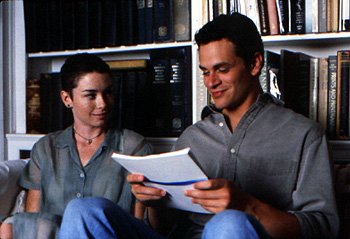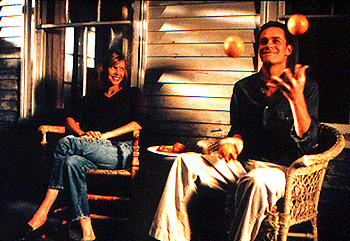![[safe]](safe.gif)

The Love Letter

Starring Kate Capshaw, Blythe Danner, Ellen DeGeneres,
Julianne Nicholson, Tom Selleck, Tom Everett Scott, Gloria Stuart
Directed by Peter Chan
![[safe]](safe.gif)


Based on Cathleen Schine's winningly whimsical novel of the same title, Peter Chan's "The Lover Letter" is a strange, inexplicably attractive film. Although it seems to have been hacked to bits in the editing room - either that or the oddly disjointed feel was deliberate - the film nonetheless retains a certain charm and a genuine feel to it.

Set in the sleepy seaside town of Loblolly By The Sea, the film opens with a scene of Helen MacFarquhar jogging vigorously around the town - her town. You see, Helen runs the bookstore in town, and, as her store manager Janet (Ellen DeGeneres) puts it, "everyone's in love with you". In her own quiet way, the "emotionally celibate" Helen seems to exude that kind of strong attraction that pulls people toward her. People like George (Tom Selleck), her old high school friend who has been carrying a torch for her for decades, and Johnny (Tom Everett Scott), a 20 year old college student who's working for her through the summer. With her daughter Emily away at summer camp, and her mother Lillian (Blythe Danner) and her grandmother Eleanor (Gloria Stuart) travelling through Europe, Helen's mail means a lot to her. Which is why when she finds a mysterious, unaddressed, unsigned love letter one day, Helen is immediately intrigued. Could it be from George? Johnny? Janet? Or some other hitherto un-declared admirer? Through a series of not-overly-cute, entirely believable circumstances, the letter falls into the wrong hands - several times - generating a level of amorous ardour that envelopes Helen's neat little world, throwing everything and everyone into a flux. Just as Helen embarks on a passionate affair with Johnny, George begins to express the desires he's kept secret through the years, and just as audiences expect a cute, pat ending, the film throws us a mature, sensible, but no less enjoyable denouement.


Opening the same week as "The Phantom Menace", this counter-programming stunt movie may not be given a fair shot at gaining an audience, which is a pity. Although this is far from being a perfect film, the roughness around its edges and its occasional mis-steps are minor infractions on a well made product. The script, by Maria Maggenti, has pared down all the emotional elements of Helen and Johnny's affair, and this is a pity since that particular aspect of the novel was especially heartfelt, genuine and wise. Furthermore, the fact that certain scenes seem truncated may indicate a hachet job in the editing room (Dreamworks did pull a similar stunt on Bronwyn Hughes' "Forces of Nature").
Director Chan's last film was the ridiculously entertaining and unexpectedly profound "Comrades: Almost a Love Story", the last film to win the Best Picture Prize in a Hong Kong Film Awards ceremony. Making his first film in America, Chan proves that he is able to not only transcend the language barrier, but also has a thing or two to show for understanding human nature. His film exudes an almost European feel, given that characters rarely say what they mean, and behave in ways that aren't pre-explained by major plot points in the script, and for its extremely lean 88 minute running time, Chan gracefully and gently steers his cast along for a memorable ride.

Led by Kate Capshaw, who's not had a good role since "How to Make an American Quilt", Chan's ensemble is expertly put through the paces to varying levels of success. Capshaw, who also produced the film, is extremely strong in the role of Helen, successfully portraying a woman who's been alone for so long that a chance at love both attracts and scares her. Partnering her beautifully, in an understated and charming turn, is Tom Selleck, as the man who won't let go, even if it means getting hurt again and again. Because the script has watered down the May-September romance, Tom Everett Scott's Johnny is a less attractive character, but the actor energetically gives it a decent shot. Ellen DeGeneres, Blythe Danner and Gloria Stuart all lend able support, with DeGeneres providing many comedic laughs and one great emotional scene. And in the great tradition of scene-stealers, Julianne Nicholson - who plays the other book store clerk who has a crush on Johnny - brings a vital, vibrant freshness to her characterization and is a delight to watch.
For fans of the novel, "The Love Letter" will prove to be a somewhat disappointing film
adaptation of a glorious book. However, through Chan's subtle lensing and the collective
efforts of his game and talented cast, what could have been a clumsy film becomes an awkward,
blossoming beauty. Full of surprising delights and with charm to spare, this is not a film to
return to sender.